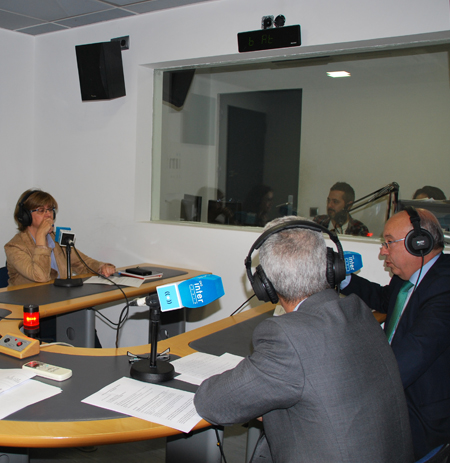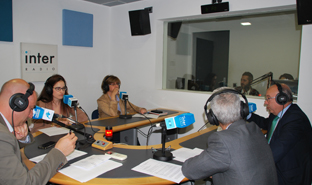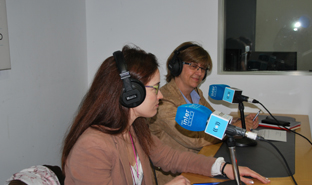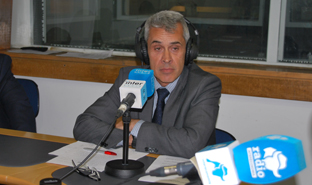49 cabecera noticia_tertulia_patrocinada_Ecogestiona_mayo 2018
SIGAUS discusses Circular Economy and innovation on the Ecogestiona Program by Radio Intereconomía
The Radio Intereconomía studios welcomed SIGAUS on May 4th to a special discussion on the program "Ecogestiona", where various aspects related to Circular Economy were debated as well as how the advances in technology and innovation are important allies when promoting this new paradigm and everything related to the correct management of waste and environmental protection.
07-05-2018

24 Párrafo Noticia_tertulia_Ecogestiona_Mayo2018
The debate was attended by the Manager for Technical Assistance and Lubricant Development of Repsol, Miguel Ángel Vázquez, the Chair of the Association of Environmental Information Journalists (APIA), Clara Navío, and the Environmental Manager of the Spanish Federation of Automotive Entrepreneurial Professionals (CONEPA), María Luisa Nieto, who accompanied the Director of Institutional Relationships and Communication of the Entity, Fermín Martínez de Hurtado.
During the event, the debate attendees highlighted the importance of contributing, each person in their own field of influence, to the progress of this new way of managing the economy, more innovative and sustainable, and of working to achieve a true change regarding the current paradigm, based on a more linear and short-term economy. In this sense, the focus of the lubricant manufacturers involves advancing in the field of technology and innovation with precisely this objective, that of protecting the environment.
"At Repsol, the higher percentage of advances of this type is due to environmental protection", said Miguel Ángel Vázquez, who stated that the company "is working more along these lines in order to design products that can be placed on the market with the lowest possible impact and that are increasingly environmentally-friendly, in line with our commitment to sustainability".
Thus, he explained, "the engine manufacturers develop new vehicles with increasing environmental requirements, and we are obliged to ensure that our lubricants and fuels are in accordance with this". Hence the importance of a truly integral vision of the life cycle of products in order to reduce the environmental impact of consumption and to involve the entire chain of value for the product in this work.
32 párrafo cita_noticia_tertulia_Ecogestiona_mayo2018
“
All sectors, particularly those related to mechanical workshops, are affected by these changes and are racing towards a more sustainable economy.
„
In the same way, "all sectors, particularly those related to mechanical workshops, are affected by these changes and are racing towards a more sustainable economy", mentioned the representative from CONEPA, who focused on a culture of return and renovation of products and their components.
"The activity of the workshops, considered to be potentially dangerous, is subject to a cascade of legislation to which they must adapt, including all upcoming legislative changes that are related to waste management and sustainability. For this reason, the regulations are, in his opinion, the main challenge to be faced by the workshops. For example, the Spanish Circular Economy Strategy, which is still a draft, "implies the modification of numerous directives, the elaboration of strategies and orientations that must be transferred to the Spanish legal system and some of which will directly or indirectly affect the workshops due to the environmental impact of their activity", he explained.
Furthermore, he highlighted that the workshops "are aware of the fundamental role that they play, not only in waste management but also in other factors with an environmental impact such as soil or atmosphere, as this sector is heavily inspected and legislated".
In the words of the environmental journalist representative, citizens have a real interest in news related to the environment and sustainability, adding that "it is our responsibility, as professionals, to seek interesting and new information and to prepare attractive information that attracts the attention of the audience, placing the environment in the position it deserves in the news, as it is transversal to many other topics such as the economy or business management".
In this sense, the Circular Economy "is a very importance source of interesting, diverse and positive news related to the environment". "Because goods news in this regard, must also be news", mentioned the APIA representative. For this reason, "it is fundamental for companies that are contributing to this progress to communicate that they are doing so, because they are examples of good practices and a means of environmental awareness and distribution", he underlined.
ADVANTAGES OF CIRCULAR ECONOMY
As an example of the environmental and economic advantages generated by a focus on Circular Economy, the SIGAUS representative referred to the environmental benefits achieved thanks to the recovery of used industrial oil in 2017, which are very significant if we consider the high quantity of waste managed each year: The used oil collected last year, 134,508 tonnes, is the equivalent of the capacity of almost 4,600 maritime merchandise containers that, transported by train, would have a length of almost 31,800 meters,
After submitting almost 94,000 tonnes of the total collected to the regeneration treatment, it was possible to return approximately 62,500 tonnes of lubricants to the market, that would be sufficient to fill the tank in 15.4 million cars, which would be two thirds of all of the cars in Spain. On the other hand, if we compare the regeneration of used oil with the generation of the same quantity of oil based on first oil refining, in 2017 we avoided the emission of 45,055 t of CO2 to the atmosphere, the same amount that would be produced by 108 return trips from Madrid to New York in one of the largest passenger planes that cover this route.
The mechanical workshops participate very actively in this work, and for them SIGAUS has a Partner Workshop Programme, through which the Entity grants a logo to the establishments that work in compliance with the regulations regarding the management of used oil, "thus making the support from SIGAUS for these establishments visible, without which our work would not be possible", mentioned Fermín Martínez de Hurtado.
To conclude, the SIGAUS representative stated that, since 2010, the Entity has focused on prevention through the Business Plans, created to promote measures that reduce the impact of lubricants on the environment. Since then, some 4,460 preventive measures have been implemented related to the manufacture of less contaminating oils, the inclusion of regenerated bases in the formulation of new oils or the commercialization of biodegradable oils, among many others, and which the companies report to the Entity each year.
"This year we have launched a new plan, with a validity of 4 years, which will take place from 2018 to 2021, and with which we hope to continue working on these lines", concluded Fermín Martínez de Hurtado.


